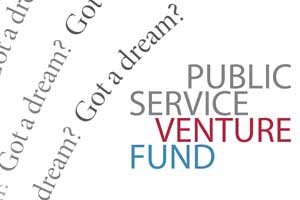Harvard Law School has launched a unique program to help students obtain their ideal first jobs in public service – even if those jobs don’t yet exist.
The HLS Public Service Venture Fund, officially launched on Sept. 25, will award $1 million in grants each year to Harvard Law graduates pursuing careers in public service. The Fund supports two kinds of post-graduate fellowships: “seed grants” for startup public interest ventures, and, through “existing organization-based fellowships,” salary support to graduating HLS students to work at nonprofits or government agencies in the U.S. and abroad.
Said HLS Dean Martha Minow: “We believe that the talent and initiative of our students can advance justice and human welfare as they pursue their dreams—and this Public Service Venture fund offers both material aid and a guide path and network of supporters for creative, entrepreneurial, careers well beyond this source of funding and this school.”
Alexa Shabecoff, assistant dean for public service and director of the Bernard Koteen Office of Public Interest Advising (OPIA), said: “The message to our students is, if they really want to do public service work, they can do it.”
While a handful of law schools offer fellowships to support alumni in public service jobs, no other school offers a formalized fellowship program with a mix of seed grants for social entrepreneurship as well as funded fellowships for jobs in existing organizations, Shabecoff said.
“In either case, we want to help our students and graduates pursue the work of their dreams, something they are not only really passionate about” but are also fully prepared to do as a result of experience in public service work through summer jobs or through the many opportunities offered by the HLS Clinical & Pro Bono Programs, Shabecoff added.
The idea for the Venture Fund began about two years ago, said Shabecoff. “Dean Minow wanted to do more to promote public service but it was the same time the economy had started going downhill, and the public service market got more competitive than ever.” While HLS students have long been successful at landing external fellowships such as Skadden and Equal Justice Work Fellowships, there was a growing need for more funding options for the increasing number of HLS students wanting to do social justice work, Shabecoff said. A committee chaired by HLS Professor Carol Steiker, the dean’s special advisor for public service, came up with the Fund to support social entrepreneurship as well as jobs at existing legal organizations and government agencies. Dean Minow and the faculty enthusiastically endorsed the concept. And in the interim two years, Shabecoff has been working with an Advisory Committee to flesh out the parameters and application process.
The seed grant fellowships are particularly exciting since HLS graduates have a strong track record in successful social entrepreneurship (see sidebar), Shabecoff said, citing City Year, co-founded in 1987 by Alan Khazei ’87 and Michael Brown ‘87. CityYear, which unites young adults for an intensive year of full-time community service mentoring, tutoring, and educating children, served as the model and inspiration for President Clinton’s AmeriCorps program and now operates in 20 U.S. cities, Johannesburg, and London. But it remains difficult for enterprising students to get funding to start new organizations for social justice because most sources require a proven track record, Shabecoff said.
To support this kind of innovation, seed grant fellowships will fund novel projects—law-related or not—designed to further social justice anywhere in the world. Seed grant fellows will receive $80,000 per year, which includes $45,000 in salary, with expectation of renewal for a second year. Any HLS alumni may apply provided that the proposed organization is in its initial stages and has few available funding sources, but there will be a preference toward funding current students and alumni at the early stages of their career. Projects must be sustainable and should not duplicate effective existing services but fill in a need otherwise not being met.
Meanwhile, the downturn in the economy means that many legal organizations and agencies have fewer staff positions, which affects public-service-oriented graduates and the communities they hope to serve. “The Venture Fund is helping provide much-needed legal talent to those communities,” said Shabecoff. Organization-based fellows will receive $45,000 for one year to work in a nonprofit or government agency. 3Ls are eligible to apply, as are judicial law clerks who graduate in 2013 or later and have not worked at another organization before clerking.
The number of fellowships will vary from year to year and depend upon the number of successful fellowship applicants in each category. Applications are due to OPIA by January 15, 2013, and applicants will be chosen by a committee. Awards will be announced in May 2013.
The Fund, administered by OPIA, will provide a host of other services to applicants, especially those applying for seed grants. OPIA is enlisting alumni to assist applicants with developing the business plan and budget required to apply for a seed grant, and also to help fellows incorporate their startups and give business and other advice.
“This isn’t just a win for Harvard Law School students and the organizations they serve, but ultimately the communities they serve, too,” said Shabecoff. “It’s another way in which we can address the justice crisis that exists.”
Visit the Public Service Venture Fund website for more information, and for application guidelines.
